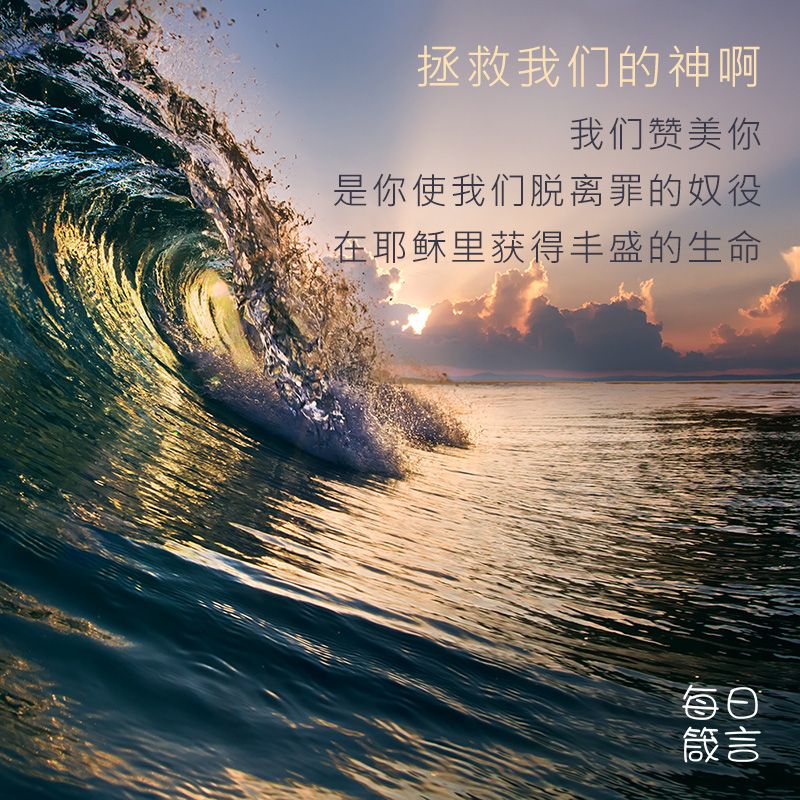“从前砍碎拉哈伯的,不是你吗?使海……的水干涸……的,不是你吗?” – 赛 51:9-10
神使祂的子民脱离了埃及的奴役(出 12:31-38),正当他们要离开时,在红海边停了下来。他们转身看到法老的军队正在急速追赶而来,不禁感到非常害怕(出 14:1-10)。但耶和华“用大东风,使海水……退去……海就成了干地”,这样祂的子民就可以顺利徒步走到对岸。
我们还在哪里听说过风(灵)与水的互动?在创世记1:2中,神的灵/风运行在水面上,为祂的创造做准备。然后,在创世记 8:1 中,神差遣风将大洪水逼退。现在,神又用大风分开海水,为祂的子民出埃及提供一条救赎之路。
当以色列人安然无恙地站在红海的对岸时,一度分开的海水却向法老的军队铺天盖地而来。神对祂子民的拯救是戏剧性的,也是具有决定性的,这一事件的象征意义正是如此。要记得,在旧约的其他经文中,埃及被描述为巨大的海怪“拉哈伯”(见诗 89:10;赛 30:7; 51:9-10)。在出埃及记中,大海被一分为二。然后,在神的命令下,大海吞没了强大如拉哈伯的埃及军队。
神拯救了祂的子民,将他们从这个混乱、充满破坏力的世界中拯救出来。从奴役中解放出来的他们被分别出来,靠着神的应许为世界带去祝福。
祷告
拯救我们的神啊,我们赞美你!是你使我们脱离罪的奴役,在耶稣里获得丰盛的生命。阿们。

出埃及记 14:21-31; 以赛亚书 51:9-10
21摩西向海伸杖,耶和华便用大东风使海水一夜退去,水便分开,海就成了干地。
22以色列人下海中走干地,水在他们的左右做了墙垣。
23埃及人追赶他们,法老一切的马匹、车辆和马兵都跟着下到海中。
24到了晨更的时候,耶和华从云火柱中向埃及的军兵观看,使埃及的军兵混乱了,
25又使他们的车轮脱落,难以行走,以致埃及人说:“我们从以色列人面前逃跑吧!因耶和华为他们攻击我们了。”
26耶和华对摩西说:“你向海伸杖,叫水仍合在埃及人并他们的车辆、马兵身上。”
27摩西就向海伸杖,到了天一亮,海水仍旧复原。埃及人避水逃跑的时候,耶和华把他们推翻在海中,
28水就回流,淹没了车辆和马兵。那些跟着以色列人下海法老的全军,连一个也没有剩下。
29以色列人却在海中走干地,水在他们的左右做了墙垣。
30当日,耶和华这样拯救以色列人脱离埃及人的手,以色列人看见埃及人的死尸都在海边了。
31以色列人看见耶和华向埃及人所行的大事,就敬畏耶和华,又信服他和他的仆人摩西。
9耶和华的膀臂啊,兴起,兴起!以能力为衣穿上,像古时的年日、上古的世代兴起一样。从前砍碎拉哈伯、刺透大鱼的,不是你吗?
10使海与深渊的水干涸,使海的深处变为赎民经过之路的,不是你吗?
A Passage Through The Sea
“Was it not you [God] who cut Rahab to pieces . . . ? Was it not you who dried up the sea . . . ?” – Isaiah 51:9-10
God had set his people free from slavery in Egypt (Exodus 12:31-38), and as they were traveling away, they came to a halt at the Red Sea. Then they were terrified as they saw that Pharaoh’s army was pursuing them (14:1-10). But the Lord “drove the sea back with a strong east wind and turned it into dry land” so that his people could cross to the other side.
Where else have we heard of a wind (Spirit) interacting with water? In Genesis 1:2, God’s Spirit/wind hovers over the chaotic waters, preparing for his creation. Then, in Genesis 8:1, God sends a wind to push back the waters of the great flood. Now here God drives the sea with a strong wind to provide a way of deliverance for his people.
And while Israel stands safe on the far bank of the Red Sea, the waters come crashing down on Pharaoh’s army. God’s rescue of his people is dramatic and momentous, and so is the symbolism of this event. Remember that Egypt is described as the great sea monster “Rahab” in other Old Testament passages (see Psalm 89:10; Isaiah 30:7; 51:9-10). Here in Exodus the sea is cut in two. And then at God’s command the sea drowns the mighty Egyptian army.
God has delivered his people, saving them from the chaotic, destructive forces of this world. Freed from slavery, they are set apart to bring blessing to the world through God’s promises.
Prayer
Saving God, we praise you for bringing us out from our slavery in sin to have abundant life in Jesus. Amen.
诵读: 骆云秀
片头: 张妙阳



